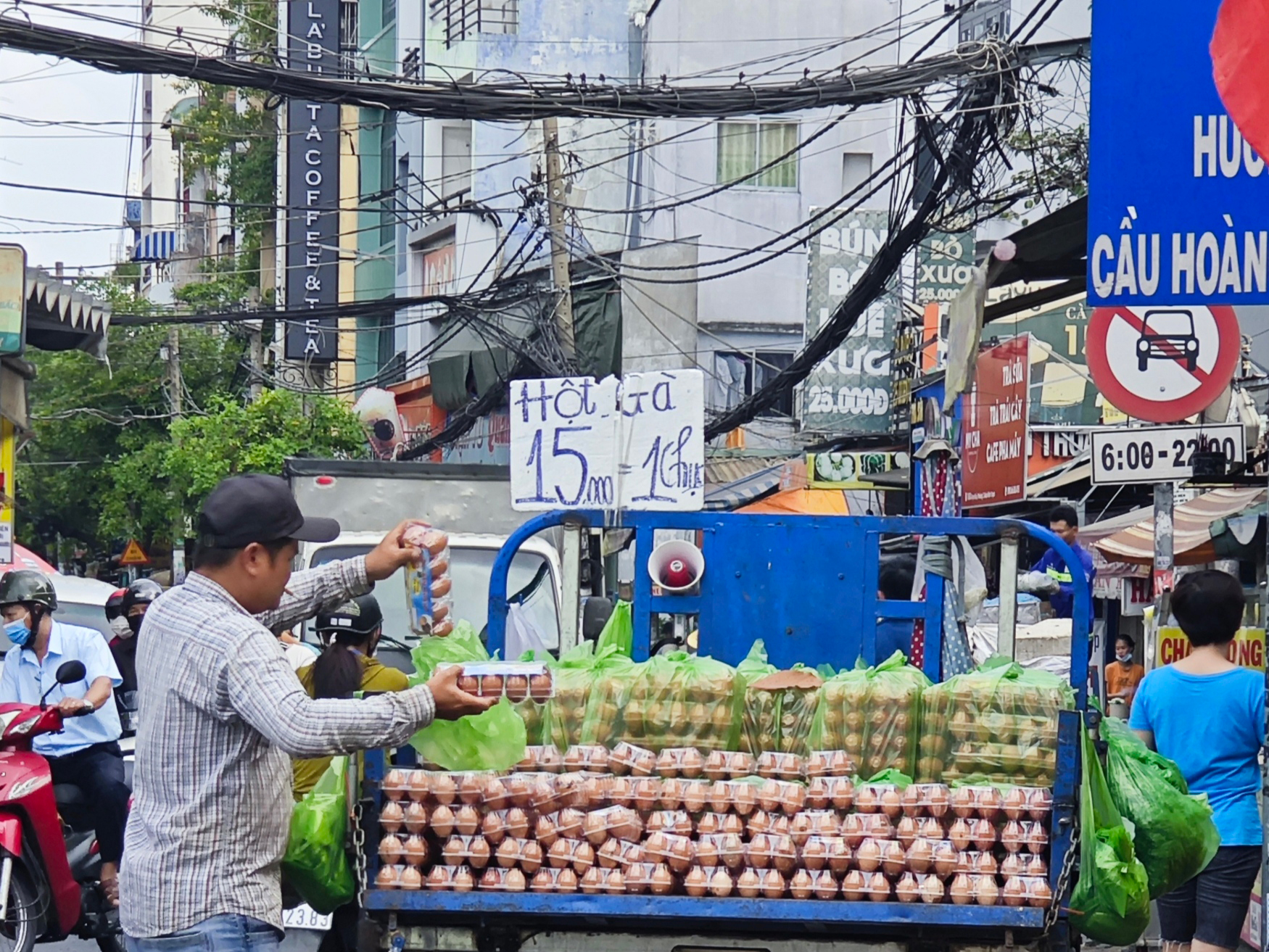In recent days in Ho Chi Minh City, many poultry egg carts have been selling at very low prices, only 15,000-20,000 VND/dozen. The prices of eggs in markets and supermarkets have also decreased significantly compared to before Tet. At a selling point on Vạn Kiếp Street (Bình Thạnh District), boxes of 10 eggs attract many buyers.
Competing to reduce egg prices
Another selling point on Vũ Tùng Street (Bình Thạnh District) is selling Bến Tre chicken eggs at only 17,000 VND/dozen and duck eggs at 25,000 VND/dozen, but there are no customers. San Hà, a brand name eggstore, is selling eggs for only 20,000 VND/dozen, which is a 10,000 VND reduction compared to the listed price.
According to Mr. Vương Quang Dũng, General Director of Vương Huỳnh Trading and Services Production Company (breeding egg-laying chickens in Long Khánh City, Đồng Nai Province), a month before Tet, eggs were priced at 1,900 VND/egg, but then gradually reduced to 1,300-1,500 VND and currently have not increased yet.
The continuous decrease in poultry egg prices before Tet was mainly due to bakeries switching to using egg powder instead of fresh eggs and a significant decrease in consumption due to workers and students taking extended breaks. “There are still leftover eggs from before Tet that have not been consumed, so it will take another 1-2 weeks. Hopefully, egg prices will recover by the end of this month,” said Mr. Dũng.
According to poultry farms in the southern region, at the current prices, poultry farmers are losing about 200 VND/egg.
Ms. Phạm Thị Huân, Chairwoman of the Board of Directors of Ba Huân Joint Stock Company, said that the poultry egg market is abundant after Tet, and one of the reasons for the decrease in prices is that the bakeries have not resumed operations. Only the consumption in the markets has started to increase.
Mr. Trương Chí Thiện, General Director of Vĩnh Thành Đạt Food Company (V.Food), said that egg consumption is usually very low in January, so V.Food is increasing its processing activities (salted eggs, preserved eggs, etc.). The production plant has to work extra hours, at 100% capacity to take advantage of the abundant raw materials and low prices.
Meanwhile, experts advise consumers to be cautious with cheap eggs sold in the market, as they may be leftover eggs from before Tet which are already spoiled or about to spoil. In fact, some consumers have reported that the cheap eggs have a high rate of spoilage, and many eggs have mixed yolk and egg white, making them difficult to cook.

Poultry eggs packed in boxes are sold at a low price. Photo: NGỌC ÁNH
Lower prices for chicken and pork meat
Not only poultry eggs, but pork meat consumption is also slow. The price of live pigs has slightly increased compared to before Tet but has not exceeded 60,000 VND/kg. Mr. Nguyễn Trí Công, Chairman of the Dong Nai Livestock Association, commented that the price of live pigs has increased slightly, but the purchasing power is still slow; pork meat consumption has decreased by about 30% compared to the same period last year.
According to the Business Department of Hóc Môn Market Management and Business Company (Ho Chi Minh City), the amount of pork meat entering the market on February 20 reached 337 tons (about 4,500 pigs), which is still less than the average amount of pigs entering the market in 2023, which was 5,700 pigs. However, compared to the first working day after Tet (February 15) with 2,180 pigs, the pig supply to the market is recovering. The price of pork at the market is currently at 77,000 VND/kg (type 1) and 70,000 VND/kg (type 2).
As for chicken meat, Mr. Nguyễn Văn Ngọc, Vice Chairman of the Southeast Poultry Association, commented that the consumption situation is very poor due to the vegetarian month (the lunar January) and partly because workers have not fully returned to work. This has kept the price of industrial chicken at the farms at a low level, ranging from 26,000-27,000 VND/kg, while the cost of rearing is around 30,000-33,000 VND/kg, meaning farmers are losing 4,000-5,000 VND/kg. It is worth noting that poultry farmers have proactively reduced their flocks by about 50% due to prolonged losses but still cannot increase prices.
According to Mr. Ngọc, the main reason is that a large quantity of imported cheap chicken meat and offal has heavily impacted domestic farming.
Vegetarian food market is bustling
In contrast to livestock farming products, the vegetarian food market is bustling during the month of January, which is the peak time for vegetarian consumption second only to the lunar July. Mushrooms, tofu, and vegetables are in high demand. Mr. Trần Công Phương Linh, Director of Saigon Vegetarian Food Company (Ho Chi Minh City), said that the company’s output is currently 2-3 times higher than usual due to orders from supermarkets and stores. In addition, pilgrimage and charity groups are also making large purchases. Among them, lotus seed vegetarian rice is the most popular item due to its convenience.
Co.opmart supermarket chain has also launched a promotion program with a range of vegetarian products, including spices (seasoning powder, soy sauce, fermented tofu), processed foods (vegetarian-stuffed bitter melon, vegetarian crab noodles, vegetarian spring rolls, stir-fried tofu with lemongrass, vegetarian rib…).
Ng.Ánh












